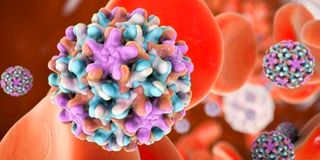Hepatitis B among children spikes in 35 countries as Kenya improves vaccination

Hepatitis B virus. Cases of hepatitis B among children have spiked in 35 countries globally.
Cases of hepatitis B among children have spiked in 35 countries globally, says the latest situation update by the World Health Organisation (WHO).
The disease has been reported in Europe and South East Asia among other regions
The report, which was released on Thursday, says the recent outbreak is largely impacting children under five.
However, Kenya is not among the countries for mysterious hepatitis in children, thanks to an improved immunisation programme.
According to the latest statistics from the Ministry of Health, the delivery of the hepatitis B birth vaccine dose within 24 hours of birth has improved the health of the children.
Hepatitis B vaccination is considered safe and effective and prevents transmission in 80–95 per cent of cases.
"Children are routinely immunised against it as part of the National Immunisation Programme," said a health official.
Expectant mothers who have hepatitis B can pass it on to their babies during pregnancy and around the time of birth. This is the most common way that children get hepatitis B in the country.
Subsequently, newborns receive the Hepatitis B vaccine at weeks six, 10, and 14.
These doses are administered at 0.5mls through injection at the left outer thigh.
According to the Kenya Expanded Programme Immunization Schedule, these doses are contained in a single shot known as Pentavalent Vaccine.
The Pentavalent Vaccine contains five antigens (diphtheria, pertussis, tetanus, and Hepatitis B and Haemophilus Influenzae Type b).
A virologist at the Kenya Medical Research Institute (Kemri) said hepatitis B symptoms include tiredness, appetite loss and energy, fever, jaundice, aching joints and rash.
Other symptoms include stomach pains (especially over the upper right side where the liver is), vomiting, dark urine and pale or white poo.
Children infected by hepatitis B need to have blood tests at least once a year to check on their infection and help doctors make treatment decisions.
There are some safe and effective anti-viral medicines for chronic hepatitis B.
Health professionals might prescribe them for older children and teenagers, especially children with liver damage.
In Kenya, pregnant women are tested for hepatitis B and those found with the virus are given medicine to reduce the chance of passing the virus on to their baby.
Women who have hepatitis B can safely breastfeed unless their nipples are cracked or bleeding.
Health officials say if a child is accidentally cut or scratched with a used needle, use soap and water to wash the child's skin where the contact happened.
The child should be taken to the hospital for blood tests and also an extra hepatitis B immunisation.
However, health officials say the risk of getting hepatitis B from this kind of contact is very low.
The officials highly recommend that children should not share toothbrushes, razors or other items that belong to someone who has hepatitis B because these things might be contaminated with infected blood.
"It is important to be aware that the Hepatitis B virus cannot be passed on by the transmission of coughs, a shake of the hand, or a kiss. Through the use of a blood test, it is possible to determine whether or not you are infected with this illness," said the medic.
Dr Philippa Easterbrook is Senior Scientist in the Global Hepatitis Programme, HIV department at the World Health Organisation Headquarters in Geneva, said over the last four months, more than a thousand cases have been reported from 35 countries worldwide.
"The majority of these cases are in young children aged less than five years and most present with the typical symptoms of acute gastroenteritis, such as abdominal pain, nausea and vomiting," said Dr Easterbrook.
According to WHO officials at least 18 children have died so far, and 48 have undergone an urgent liver transplant for acute liver failure.
The cause has not been established so far but the WHO official said that there was no evidence of common exposure to foods or water, or to medications or other household members.
"There was no evidence for a link to Covid-19 vaccination since almost none of the affected children had been vaccinated. But there was an early clue that a common virus called adenovirus may have a role either acting alone or as a co-infection with another virus such as Covid either past or current Covid infection," said Dr Easterbrook.





